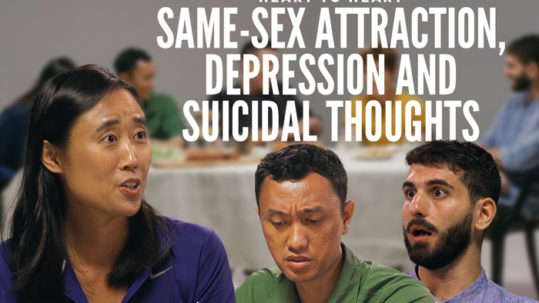18 Apr How to Talk to Your Teenager About Homosexuality

“Who am I and why am I here? Do I have a purpose which God will help me discover? Or do I get to create my own meaning for myself and life?”
If your kids are at this stage and you haven’t already taught them the big picture frameworks suggested previously in this resource, it’s never too late! The four-part story of humanity, different types of love and the unique characteristics of marriage are topics you can still discuss with older children. Secondary school students and those older should know and understand these basic truths.
But these young people are also able to deal with more abstract concepts. So as part of setting the framework for talking about homosexuality, it would be helpful to talk to your children about competing worldviews that attempt to define who we are, why we are here and where we derive our answers to those questions. Let’s set the stage by describing two competing worldviews.
The first comes from the Bible and historic Judeo-Christian teaching. It says that God designed us, and that He created us for a purpose—to love and know Him, to love and know others and to do good work in this world. We have intrinsic value and meaning that comes from being created in God’s image and likeness. The good work that we do includes creating and nurturing families.
We are given gifts by God—thought, reason, creativity, family, relationships, sexuality, imagination, feelings, words and more—and as we grow and connect with God and others, we grow in these gifts and in our discovery of who we are. We have meaning and purpose, which we discover with God’s help and begin living out.
Our bodies have purposes too, and when a husband and wife unite sexually, they form a complete reproductive system. Their union has the capacity to bring forth new life.
Our bodies have purposes too, and when a husband and wife unite sexually, they form a complete reproductive system. Their union has the capacity to bring forth new life. Homosexual unions lack this significant capability.
Scripture also teaches that God gives us the ability to make choices. But our freedom to make choices has been damaged and distorted by sin. Sin causes us to want, pursue and do things that aren’t good. And ultimately, freedom is lost as sin takes control. We are enslaved by sin—powerless and addicted, so to speak—and lose our ability to choose good. We are separated from God and unable to grow into all we were created to be. The good news is that Jesus opened the kingdom of God to all—including those under sin’s control. Because of His life, death, burial and resurrection, we may become His children, be free from sin and discover our purpose.
In the Jewish and Christian view, marriage between a man and a woman was not created by man or originated by the government, but is a gift from God, with family flowing from the joining together of a husband and wife.
In the Jewish and Christian view, marriage between a man and a woman was not created by man or originated by the government, but is a gift from God, with family flowing from the joining together of a husband and wife. Most societies have recognised the good of marriage between a man and woman and have set it apart as the best place for sexual expression and creating family. Family is the basic building block of society, because from it comes the next generation of citizens. And though, again, these good gifts have been marred by sin, God is in the process of redeeming them for those who follow Him.
On the flip side, there are those who believe and teach that there is no God, and “the only real meaning I have in life is what I choose. I don’t have a purpose or ultimate end; I can be whatever I want.” We define ourselves and give our lives meaning.
In this view, everything is up for grabs—the self, sexuality, marriage, family and children. So marriage can be redefined to be something that it’s never been before—two men or two women. Sexual relationships only have the meaning that I choose to give them. Culture or the individual gives parameters for sexual relationships, with the current ethos being, “I can do whatever I want, as long as no one gets hurt.”
In this non-biblical, human-centered view, sexual activity has been separated from marriage and procreation, and even from being a male-female union. It becomes more about seeking pleasure or self-fulfillment.
Even male and female can become whatever I choose, or I may choose to identify as and express myself as neither, both or something completely different. If gender is a social or personal construct, then I can be whatever I choose. That’s one reason why groups push for the abolition of “male and female” and “mother and father” from documents and language. Or online platforms may offer custom genders when people sign on.
Basic Concepts
- God created you to know and love Him, to know and love others, and to do good work with Him in this world—and in heaven beyond!
- Identity, meaning and purpose come from being created and redeemed by God, from being in His family.
- Marriage and family have real meaning, value and purpose too, not just what society or individuals assign to them.
- We treat all people with kindness, love and respect.
- We live in a world with competing worldviews; the Christian worldview is in direct conflict with the dominant, secular worldview that rules today.
- The world is growing more and more antagonistic toward Christians and our view of sex and sexuality; we must be bold and courageous, speaking the truth in love.
- Some individuals and churches are shifting away from a biblical worldview, rooted in Scriptural truth and centuries of church teaching, to a secular worldview, based on opinions and feeling.
Real-Life Scenario
Your brother, Mike, has come out to the family as gay and is bringing his same-sex partner to the upcoming family gathering.
Even though we don’t agree... we will treat them with kindness and respect.
Possible Responses
These depend on the ages of your children, their level of concern and their understanding of relationships and sexuality:
- “Uncle Mike now identifies as gay. That means he is romantically attracted to other men and embraces this as his identity. He is bringing his partner to our next family gathering. We still believe God designed marriage and sexual love to be between a husband and wife. Even though we don’t agree with Uncle Mike and his partner, we will treat them with kindness and respect. Please come and talk to me or mom if you have any questions.”
- “You know God made us male and female in His image, and the Bible explains that God gave us marriage between man and a woman as a good gift. Well, not everyone follows God’s plan. Uncle Mike just told us he identifies as gay, and he wants to follow those feelings in his life. He is now living with his partner and will be bringing him to the next family gathering. We love Uncle Mike and pray he’ll return to following God’s design for marriage and sexuality.”
- “We don’t believe that Uncle Mike was born gay or that God made him homosexual. And we don’t know all the factors that have influenced him in that direction. We are going to love him and his partner, and we’ll pray for them. We disagree with his decisions, but that doesn’t mean we love him any less. It’s hard when someone you care about moves in a direction that is contrary to God’s plan.”
Real-Life Scenario
Your teenage daughter has a good friend, “Kevin,” who has just confided in her that he thinks he’s gay. She’s come to you with questions and is looking for advice and support.
Possible Responses
Your daughter needs to know that you are safe to talk to, and that you love and care for her. She also needs to know that she can’t carry this issue alone, that it is not her responsibility to rescue or save Kevin, that you will help her set healthy parameters on her relationships and that you also care for her friend.
We believe the family is foundational for individual health, growth and security. However, while parents should be the safest people to talk with about sexual struggles, this is not always the case. So while we believe, at some point, this young man will need to talk with his parents about his homosexual struggles, we don’t suggest you rush out and tell them—or anyone else. Your role in this disclosure depends on your relationship with Kevin and his family. Not all parents handle this situation well. You should ascertain first, by discussing with him whether his home situation is one of safety and security. Talk with him about how he thinks his parents will respond and about resources and help that are available if they don’t respond well.
Depending on your family and Kevin’s, you might reach out to involve him in some of your family activities, such as dinners, movie nights and game nights. Dad, in particular, should take the initiative here in connecting with Kevin. Our purpose in suggesting this is that your daughter’s relationship with him shouldn’t develop completely separate from and outside of your family. It’s fairly common for guys who struggle with same-sex attractions to connect emotionally with girls and women. Where they often need help is in building healthy, non-sexual relationships with other boys and men. Here are some suggestions for talking with your daughter:
- “How can we best help you in this situation? You know what we believe about homosexuality, because we’ve talked about it. What kind of love and support do you need from us right now? How are you doing with what Kevin shared?”
- “You know that we believe God made us male and female in His image, not gay and straight. Those are man-made labels. But we also know that sexual struggles impact a person deeply. How can we communicate truth and love to Kevin in a helpful way?”
- “Sweetie, we’re so glad Kevin felt safe to talk to you about these important issues. That’s a heavy burden for him to carry. We are praying for God to move in Kevin’s life so he will know God’s love and follow Jesus. If he wants it, there is good Christian counseling that can help him understand his attractions and respond to them in a biblical way. Can we pray together for Kevin?”
- “It’s important that Kevin’s parents know, at some point, about the issues he’s struggling with. If we can help by meeting with him and talking, we’re willing to do that. We could help him understand what he wants from his family and how he thinks they might respond. We’d also be willing to be there when he talks to his family. Please let him know we are willing to do that.”
Identity, meaning and purpose come from being created and redeemed by God, from being in His family.
If your family does engage Kevin in relationship, it’s important to communicate a few things:
- You love him no matter what. But love doesn’t mean you agree with every choice he makes in response to having same-sex attractions.
- Encourage him not to identify too early or too strongly as gay. Encourage him to see his identity as a man created in God’s image, and if he is a believer, his identity is primarily as a child of God, a follower of Christ. Those are more important than same-sex desires.
- In the U.S., young people who identify as gay, lesbian or bisexual have a greater number of health-risk behaviors, including early sexual activity, compared to those who identify as heterosexual. One of the fastest growing groups with new HIV infections is boys and young men ages 13-24.
- Some research demonstrates that teens who identify as gay don’t always have the same identity later in life. Encourage Kevin to begin following God’s design for sexuality, in spite of same-sex attractions.
As mentioned in the previous section, some teens may ask about the sexual behavior of homosexual-identified men and women. Of course, answering this question is up to your discretion, but we suggest not going into a lot of detail.
Keep it short and simple, but honest. Remind your kids that when a husband and wife unite sexually, they form a single reproductive unit; their bodies were made to fit together naturally. Same-sex couples can never form a reproductive whole. Homosexual activity is fundamentally different from a marital union.







